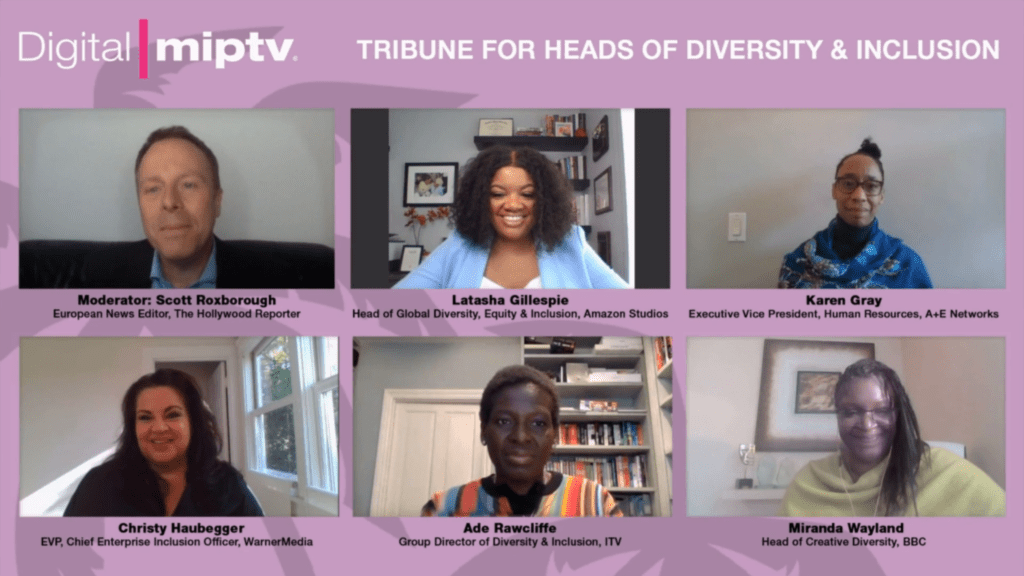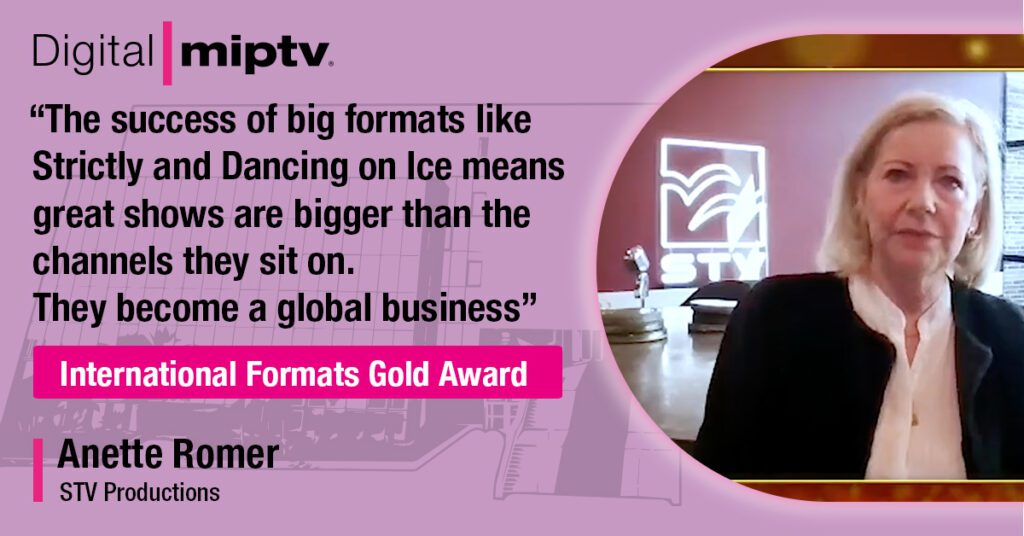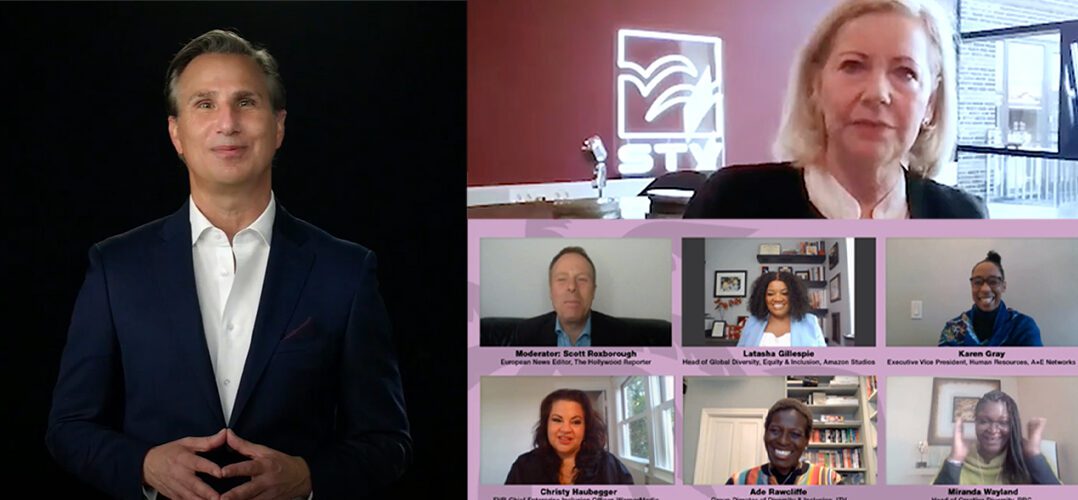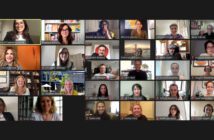There was a strong emphasis on diversity and inclusion on day five of Digital MIPTV. Among event highlights, A+E Networks President Paul Buccieri was presented with the second annual MIP SDG Award, in recognition of his company’s work towards the UN’s Sustainable Goal 10 (SDG-10) “reducing inequality”. There was also an insightful panel in which diversity chiefs from Amazon, Warner Bros, A+E Networks, the BBC and ITV shared their experience in building and activating systems that can support fairer access and representation in the content industry [Tribune for Heads of Diversity & Inclusion].
The MIP SDG Award celebration – the only Digital MIPTV session made available to watch freely on YouTube, above – was introduced by Robin Roberts, anchor of ABC’s flagship show Good Morning America, who explained that the award is “presented to media companies that make a difference”. She said: “Paul Buccieri, as President of A+E Networks, is receiving the award for the company’s achievements in reducing inequality through stories; and for initiatives that empower every voice, prioritising inclusion, kindness and respect for everyone.”
There were also opening remarks from the UN’s Under-Secretary-General for Global Communications, Melissa Fleming. She said: “The decision to focus this year’s award on SDG-10, reducing inequalities, is especially relevant. COVID-19 has hit the most vulnerable among us the hardest. It has deepened existing inequalities, endangered the vulnerable, fuelled discrimination and thrown people into poverty.”
Fleming congratulated Paul Buccieri and the teams from A+E Network for integrating messaging of the SDGs in their programming and urged “others in the TV industry also to play their part in deploying broadcasting for the greater good of humanity. The TV industry can play a major role in highlighting some of our biggest challenges – including vaccine access, overcoming poverty and climate action. The Goals are our roadmap to creating a better world, and the impact of the COVID-19 pandemic has made them more relevant and more needed than ever.”
A film produced especially for the SDG Awards event highlighted some of the joint initiatives established by the MIP markets and A+E around diversity and inclusion. These include The Diversity Summit, The Diversify TV Excellence Awards and the Women in Global Entertainment Event. Lucy Smith, director of MIPCOM and MIPTV, said A+E and MIPTV parent company Reed Midem “share a real passion and desire to keep the entertainment industry moving forward in a quest for equality and to create change for good.”
Accepting the Award, Buccieri said: “I’m so honoured to receive MIP’s SDG Award. At A+E Networks, we believe that striving for equality is a never-ending process. This recognition further validates that we have made progress, working with partners for positive change. Our goal is to empower diverse and dynamic voices. We want to use our content platforms to entertain and be a powerful force for transformation.”
The awards film outlined several of the reasons why A+E Networks received the MIP SDG Award. The company has sparked global conversations with documentary series such as Surviving R. Kelly, while being a vocal advocate for breast cancer research for over 25 years. It has also launched a new initiative focusing on people making real change in their communities called Voices Magnified.
A+E Networks’ corporate social responsibility events, referenced above, have provided powerful forums to discuss critical topics pertaining to diversity, equity and inclusion (DEI) and women’s issues; they also provide important networking opportunities among all level of executives in the global media business – connections that ultimately spark change.
Lifetime’s Broader Focus initiative, meanwhile, has elevated Lifetime to an industry leader where 82% of writers, 78% of directors and 67% of producers are women. In the corporate realm, A+E Networks partners with groups that support equality. Internally, it is creating task forces to achieve concrete corporate action and it is razor-focused on continuing to build a culture of diversity and inclusion.
Tribune for Heads of Diversity & Inclusion
The Tribune for Heads of Diversity & Inclusion [April 15, 5.45pm] brought together five talented and influential women to discuss the progress their respective organisations have made in embedding DEI into their working practices and decision-making. First to comment was Latasha Gillespie, Head of Global Diversity Equity and Inclusion at Amazon Studios, who said: “For me, the biggest achievement we have made is to put structural and systematic changes in place, so that we have diverse representation in front of and behind the camera – and to ensure access for talent normally kept out of this business. I think we have pushed past good intentions by putting structures in place.”

Christy Haubegger Executive Vice-President, Chief enterprise Inclusion Officer at WarnerMedia, agreed that “systems and processes” are crucial. “You have to set goals and create systems that comprehensively address inclusion, both in the workforce and in storytelling. We’ve spent a lot of time working with showrunners and development executives because it’s just as important to know how to manage and navigate DEI on set and in writers’ rooms as it is in executive offices.”
Ade Rawcliffe, Group Director of Diversity and Inclusion at ITV in the UK, said her company has introduced “a diversity acceleration plan that has put this issue at the front of the agenda for everyone. In the past, DEI has tended to be driven by a coalition of the willing – but now it’s embedded it into everybody’s job from senior to entry level.”
Rawcliffe said she was especially proud of ITV’s decision to support the Diversity dance troupe’s expression of how they felt about the issue of discrimination, as crystallised in the BLM movement, on Britain’s Got Talent: “Their dance routine attracted 24,000 complaints, but we took out adverts saying we stood with Diversity. That created an important shift in perception of ITV’s brand.”
Miranda Wayland, Head of Creative Diversity at the BBC, echoed her fellow panellists and stressed the importance of including suppliers in any discussion about DEI: “We need to be clear about the kind of programmes we want to see, so we have created tools to help suppliers grapple with issues around race and privilege. Our creative allies tool kit is all about supporting under-represented groups.”
Karen Gray, Executive Vice-President, Human Resources at A+E Networks, said she takes great pride in “the small moments, when an employee says inclusion has become so much better, when they tell me they were going to leave but have decided to stay.” A pivotal move in HR, she said, “is the way it has become more analytical. Lack of DEI within a production company or other organisation isn’t just happenstance – so now we can really look at the reasons why. Often, I think it helps to get a third party involved. People put up a lot of defensive mechanisms to explain why they haven’t progressed DEI, so it’s good to have someone with clear eye explain the reasons why they have been a blocker.”
One message that came through loud and clear is that DEI needs to be addressed at every level of an organisation. Gray, for example, warned against “homogenous interview panels” that tend to result in “groupthink”. Wayland, meanwhile, stressed the importance of using the right language in job ads, so that some sectors of society, for example women, are not immediately put off from applying. “You have to think about the impact an application form might have on someone with a disability or from a lower socio-economic background. Maybe an ad needs to be in a different language to reach regional talent.”
Rawcliffe built on the point by saying: “We need to be more active in recruitment. If people are not coming to us, we have to go out and find them. Just sitting there won’t bring about the changes we want.” Haubegger added that getting the first members of a particular community through the door of an organisation is often the hardest job: “One’s a token, two’s a minority, three’s a good start,” she said.
Rawcliffe added that getting people into organisations is only the first part of the DEI process: “People have to feel like they can be their authentic selves at work. Some leaders are not good at managing difference – and need to understand how micro aggressions and micro affirmations can impact the way people in a team feel.” Gray agreed, saying that people need to be given the chance to shine on their own terms. “They weren’t just hired because of their colour or identity, so they need agency. You can’t have diverse representation without it.”
Perhaps not surprisingly as an Amazon executive, Gillespie stressed the importance of “data. It’s so critical to measure at every stage.” Rawcliffe concurred, saying “you can’t change what you don’t measure”. Karen Gray from A+E Networks agreed that data and systems are crucial, but said it was also important to believe people’s anecdotes about their experience of working in a particular firm. In a similar vein, she said that one way to break the cycle of nepotism and execs recruiting in their own image is to “ask people from diverse groups if they can recommend anyone else. Usually if you take the time to enquire you discover that they know six or seven people.”
One of the biggest challenges identified by Wayland is the incredibly nuanced and complex nature of the DEI agenda – with so many subsets of society needing representation. One possible response to this is to look through the lens of intersectionality – to think about people who may represent multiple voices: “There has been real progress in female leadership,” she said. “We’ve seen a real influx of women being supported, nurtured and developed. But it’s important that it’s not just a certain demographic of women being promoted. You can advance women who also have a disability or are of colour.”
Haubegger said one of the biggest challenges is the inertia in the industry. “People will usually do the right thing if it’s not very hard. If it involves one phone call that’s fine, but not if it means five. So I see part of my job as being, ‘I’ll cut your meat for you’. I’m a real believer in building systems that take all of the excuses away.”
In terms of current trends, Wayland said it is crucial that, as the industry recovers from Covid-19, DEI doesn’t get overlooked. “There’s an urgency to build back, but it must be done with diversity.” Gray added that movements like Black Lives Matter had created a lot of positivity and dynamism around DEI right now but stressed that it is “human nature for that energy to dissipate eventually and for us all to return to a comfortable pace. That’s why it is so important to push for systematic change now in areas like hiring, compensation and vendor relationships. So that it isn’t possible to just go back.”
Anette Romer Wins Gold At The International Format Awards

This week also saw Anette Romer secure the Gold Award at the International Format Awards, hosted by MipFormats in association with FRAPA, EMC and C21 Media. On day five of Digital MIPTV, Rohmer talked about her distinguished career in formats and the challenges to come as the sector recovers from Covid-19.
Romer spent three decades at TV2 Denmark, before leaving in 2020. While at TV2, she brought formats including Who Wants To Be A Millionaire, Jeopardy, Wheel Of Fortune, Task Master, Strictly Come Dancing and Race Across The World to Denmark. Her career has very much tracked the emergence of the global format business. “My entry into television coincided with the launch of TV2, which was based on the Channel 4 UK model. At that time, there weren’t many indie producers in Denmark so I turned to international. My very first format deal was for an Action Time show called This Is Your Fridge, which was brought into Denmark by Sweden’s Annie Wegelius.”
Romer recalled there was criticism at the time because she had invited a Swede to make an international show, rather than turning to local suppliers. “It is strange to look back at that criticism,” she said, “given the level of consolidation we have seen in the formats business.”
A key part of Romer’s success has been her relationship-building skills. After forging a partnership with the late Annie Wegelius, another key breakthrough came when she bonded with Celador’s Paul Smith over a show called Gibberish. When Smith then created Who Wants To Be A Millionaire?, Romer was at the front of the queue for securing Scandi rights. She also opened Denmark’s doors to hit formats including Changing Rooms and Ready Steady Cook.
She recalls that Strictly Come Dancing was a tough sell internally, but “I had done dancing classes as a child and just felt it would work. The show continues to be a big success for TV2 to this day.”
Romer said she has been struck by the power of leading format brands: “Shows like Strictly and The X Factor are phenomenal, they have become bigger than the networks they sit on. But the good news is that new players keep emerging into the format business. Look at the creative boom out of Israel, for example,”

After leaving TV2, Romer joined another Nordic outfit, STV Productions, as consultant. At that time, she said: “I feel very passionate about the field of formats and it is a very welcome challenge to continue to use my expertise. I have a long-standing relationship with STV, a company with solid values built up and professionalised over three decades and I hope to contribute to the continued success of the company.”
In addition to her day job, Romer has always been a champion on behalf of the formats sector, contributing her expertise to MIPTV/MIPCOM advisory boards and generously offering her insights to industry reporters. This, in combination with her close relationships with producers and distributors, is sure to make her a popular industry choice to win Gold at the International Format Awards.
These sessions, and many more, are available for Digital MIPTV delegates to watch on demand. More info here…




